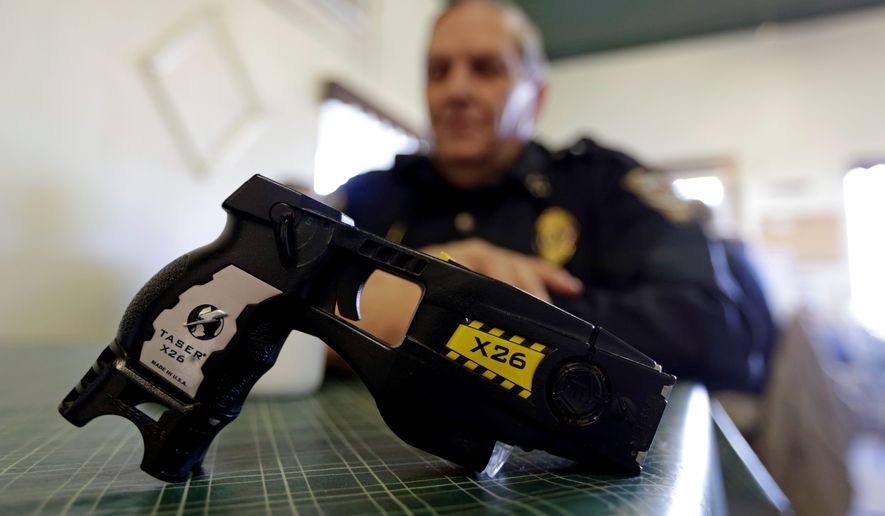Second Amendment advocates are broadening attacks on laws that limit self-defense options, with three D.C. residents suing the District over the city’s ban on the possession of stun guns and Tasers.
In a lawsuit filed Tuesday in federal court, the residents argue that the ban on “destructive devices” is unconstitutional and deprives them of the right to carry nonlethal weapons for protection.
“It’s actually not that rare that Tasers and stun guns are banned, but it’s pretty incongruous with the fact that in every jurisdiction now, there are provisions for people to carry firearms for self-defense,” said attorney George Lyon, who is representing the residents. “To have a ban on a weapon that is nonlethal, to me, is irrational.”
Mr. Lyon has been a party in two previous legal battles that ended the District’s ban on firearm ownership and its ban on concealed carry of handguns.
New York, Rhode Island, New Jersey, Massachusetts and Hawaii also outlaw stun gun possession, as do multiple counties and cities, according to UCLA law professor Eugene Volokh, who has researched stun gun laws.
Despite the numerous jurisdictions that ban the devices, Mr. Volokh said recent legal challenges to such laws have succeeded.
“The few cases that have dealt with the issue in lower courts have either held or decided that these kind of bans are unconstitutional,” said Mr. Volokh, adding that he thinks the D.C. lawsuit has a good chance to prevail.
The legal challenge comes after stun gun bans were thrust into the spotlight in March, when the U.S. Supreme Court threw out a Massachusetts court ruling that had upheld a woman’s criminal conviction of carrying a stun gun in violation of a state ban. The ruling did not overturn the ban but did reject the arguments invoked by the Supreme Judicial Court of Massachusetts, in which judges ruled that stun guns were not protected because they “were not in common use at the time of the Second Amendment’s enactment.”
The U.S. Supreme Court ruled that the lower court’s decision contradicted justices’ findings in the landmark gun rights case Heller v. District of Columbia that Second Amendment protections extend to arms “that were not in existence at the time of the founding” of the country.
Mr. Lyon said his lawsuit was in the works before the Supreme Court ruling, but the decision spurred the filing of the case.
One of the plaintiffs is conservative commentator Crystal Wright, who writes the blog “Conservative Black Chick.” According to the lawsuit, Ms. Wright has been subjected to threats of violence as a result of her published commentary and would like the ability to arm herself with a Taser.
While Ms. Wright is trained to used firearms and is contemplating buying a gun, the lawsuit states she would “prefer to minimize the likelihood that she would have to resort to deadly force in the event she is forced to defend herself or her home from a violent criminal attack.”
The two other plaintiffs are Brenden Turner, who says he has twice been the victim of an armed robbery, and Traci R. Dean, a nurse who often works night shifts.
Each of the three plaintiffs were unable to purchase Tasers and were told by company representatives that D.C. law prevents the sale of the devices to city residents.
A spokesman for the D.C. Office of the Attorney General said city lawyers had not yet seen the lawsuit and that officials would not comment on pending litigation.
Nelson Lund, a constitutional law professor at George Mason University, said the Supreme Court’s decision in the Massachusetts case is unlikely to provide support for other stun gun ban challenges because it did not overturn the state law. But he noted that such bans “tend to get struck down” when challenged directly.
A ban on stun guns was overturned in Michigan by a state appeals court in 2012.
An outstanding issue not addressed in the Massachusetts case is whether there is a right to carry a nonlethal weapon outside the home, Mr. Lund said.
In jurisdictions that do allow possession of stun guns, regulations vary widely on where and how they can be carried, Mr. Volokh said.
“There are some places where you can carry a stun gun like you can carry a flashlight, but there are other states where carrying a stun gun is prohibited,” he said, noting that most case law on the topic tends to be related to the possession of the devices rather than the carrying of them.
When the District’s ban on the concealed carry of firearms was struck down, city officials drafted regulations that limited public places where handguns could be carried and restricted the approval of concealed carry permits to individuals who could prove a “good reason” to carry. Those regulations are the subject of several lawsuits challenging their legality.
Mr. Lyon said he expects a similar uphill battle over stun guns.
• Andrea Noble can be reached at anoble@washingtontimes.com.




Please read our comment policy before commenting.